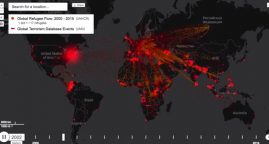Resolution of Israel-Palestine conflict requires “leadership and vision”
The quest for a two-state solution to the Israel-Palestine conflict requires “leadership and vision” that has been “starkly absent for far too long.”
That’s the view of Nickolay Mladenov, UN Special Coordinator for the Middle East Peace Process, addressing the Security Council on Thursday.
He said that a long-awaited report from the Middle East Quartet on the peace process, would be published on Friday.
Daniel Dickinson has more.
The Quartet, which consists of the UN, the United States, the European Union, and Russia, would not seek to assign blame to either side for the current impasse, said Mr Mladenov.
Rather, it would provide a “way forward” to support the goal of a “negotiated, two-state solution”.
He said the many obstacles that have brought negotiations to a halt, including Israeli settlement building, Palestinian terror attacks, and the control and reconstruction of Gaza, needed to be overcome.
“A peaceful future is what is at stake here. Taking bold steps to move beyond the empty platitudes, beyond the mutual accusations and beyond the deeply entrenched lack of trust, requires leadership and vision that has been starkly absent from this conflict for far too long.”
He said that if Israeli and Palestinian negotiators followed the Quartet’s proposals, then a “navigable course” to a lasting peace was possible, but this would have to happen through “direct bilateral” talks.
He said that the UN Secretary-General, as a Quartet member, would continue “unwaveringly” to support both Palestinians and Israelis on the path towards two states, living side by side “in peace, security and mutual recognition.”
Daniel Dickinson, United Nations.
- Resolution of Israel-Palestine conflict requires “leadership and vision”
- Two-state solution for Israel and Palestine is “possible”
Related Articles
Address of pope Francis To the Diplomatic Corps
Pope Francis held on 8 January 2018 his greetings to the diplomatic corps in the Royal Hall of the Vatican Apostolic Palace.
Safe havens: why cities are crucial to the global refugee crisis
06/06/2017. The world is facing unprecedented levels of population displacement. At least 65 million people are on the move, including 21.3 million refugees and 31 million internally displaced persons since the beginning of 2016.
Ten humanitarian crises and trends to watch in 2019
These 10 crises and trends will help shape our coverage in 2019. Here’s why they have our attention and should demand yours.






